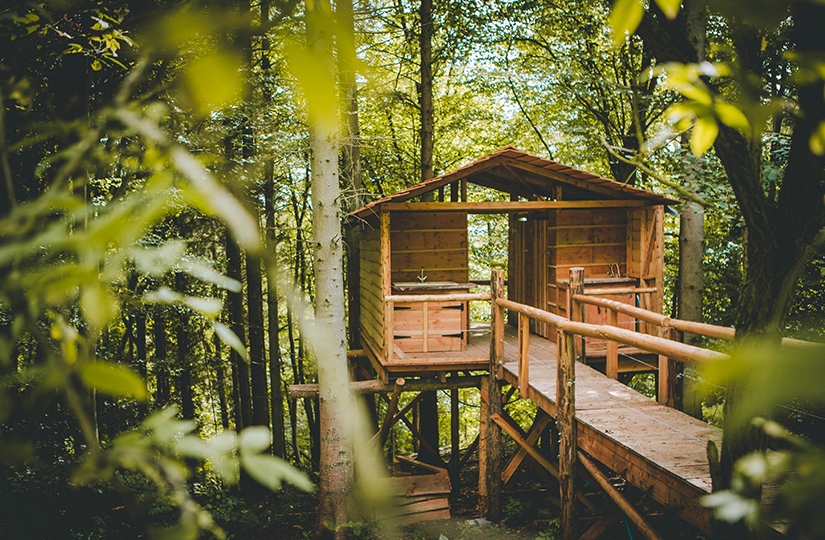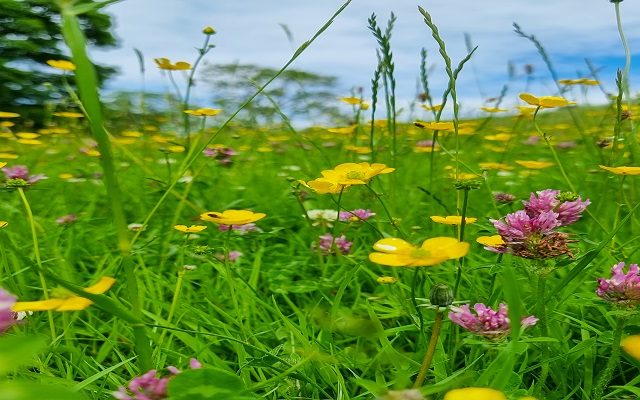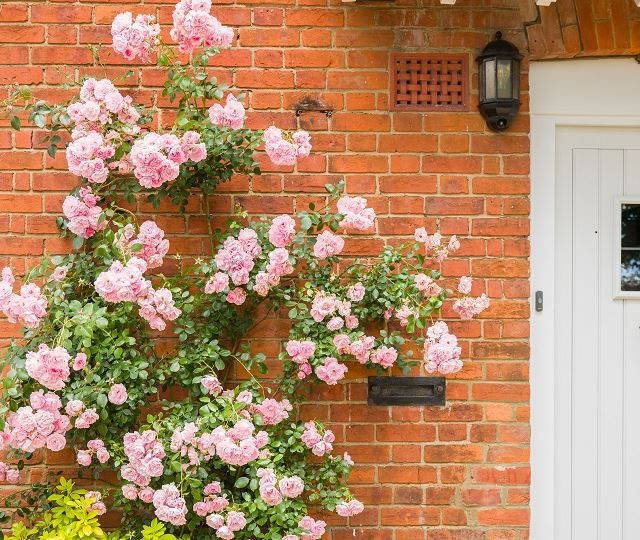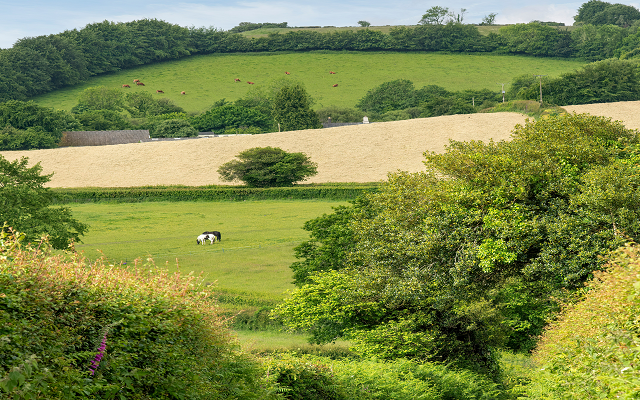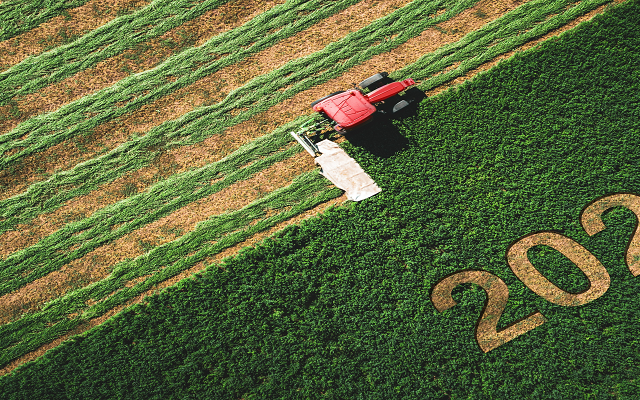Businesses we admire: Campwell
‘Rewilding’ isn’t just for places, it’s for people too, believes Tim Bowles, founder and owner of Campwell, an off-grid, eco camping business that aims to inspire people to live ‘more simple, natural and adventurous lives’.
Tim has been welcoming stressed-out city folk to camp in bell tents on his family’s sheep farm above the gently undulating Limpley Stoke Valley in Wiltshire for the past eight years.
It’s been so successful that he’s recently expanded to a village of yurts, log cabins, treehouses and a shepherds’ hut in a nearby wood, increasing his accommodation from nine units to 17, and raising the occupancy to 60 people.
Strutt & Parker first started working with Tim in 2015 and advises him on an ongoing basis on his diversification strategy.
In an average year, he welcomes 1,200 guests to his farm camp, and took bookings for 1,000 visitors to the woodland camp last year – its first season, which only began in July due to earlier COVID restrictions.
‘At our core, we’re a hospitality business making nature more comfortable and accessible,’ says Tim. ‘But we go deeper – we inspire people to live differently, to connect properly with each other around a fire, like our ancestors used to, rather than through a WhatsApp thread – it’s a reminder to be more human.
‘We have our own style too and make the accommodation look great – we keep it simple and uncluttered, with a rustic, Scandinavian feel, using cushions, woollen blankets, lanterns, pot plants, sheep skins from the farm, and wood-burning stoves.’
Guests are encouraged to explore their surroundings and go wild swimming and canoeing, while loud music is discouraged and artificial lighting is kept to a minimum so people can enjoy the stars and not disturb wildlife. This is important, since one in six bookings comes via Canopy and Stars, a booking website for peaceful, rural accommodation.
Through partnerships with local businesses, Campwell also offers foraging experiences, yoga retreats, archery lessons, pop-up suppers in the outdoor camp kitchens, and ‘wild workouts’ with a personal trainer.
For children specifically, the business has enlisted a forest school facilitator to teach them about trees and how to build shelters and campfires.
‘It all depends on the guests though,’ says Tim. ‘Some want to just chill out and breathe fresh air, others want to get under the skin of nature.’ Comments from guests clearly show though that he’s tapping into a need in people’s increasingly urban lives.
‘I had a mum who said “thank you for giving me my kids back” because they had been glued to tablets and phones, but with us they had a ball in our woods and sitting around a campfire,’ says Tim. ‘We also have city dwellers who arrive terrified, but end up really engaging with the site, the environment and even enjoy the compost loos – it’s great to see,’ he says.
Tim charges a little more than local competitors due to his offering, and he says his profits are good, with an operating profit margin of 30-40%. He’s the only full-time member of staff, but he now employs seven part-time.
Developing the Campwell concept
Tim’s business concept took shape following his own experience of city life. Growing up, he was creative and had never been into farming, so left home to study a marketing and management course at Newcastle University.
This led to a year in London working as an advertising executive for Asian brands, where he developed his love of branding and travel, before he spent three years in Hong Kong working as a wine merchant.
But city life wasn’t quite Tim. ‘London was stressful, and while Hong Kong was great fun, I found city life quite anxiety-inducing,’ he says. ‘I missed friends and family too and wanted to move home.’
Back in green space and fresh air on the farm in 2013, Tim gradually felt much better. ‘Life felt more in sync with my values in the countryside, I felt more myself again,’ he says.
But although he was the fifth generation of his family on the farm, he knew the 50ha (120 acre) mixed sheep unit couldn’t support him as well as his Dad and step-mum, who had already diversified into holiday cottages.
Tim wanted to be his own boss, but do something in-tune with his values. ‘I’m a bit of a black sheep and I’ve always found modern life quite overwhelming,’ says Tim. ‘But I’ve always been a bit obsessed with making fires and building dens, and so I wanted to create a business that would allow me to do that.’
He’d noticed glamping becoming popular, but it didn’t feel quite right. ‘I hate the term glamping,’ he says. ‘I don’t think camping should be glam, it’s about reconnecting with nature.’
But it did feel close to what he wanted. ‘I did a business plan – although I think they’re a bit old-school – and I researched what others were doing in the area, what they were charging, and crunched numbers,’ he says. ‘But I had to blag a lot of it and just learn as I went along.’
Establishing brand values
One thing Tim was clear on though was the importance of branding. ‘I’m quite precise about branding and getting the marketing right and it’s been critical in helping us grow,’ he says. ‘Getting differentiation right is key – the market isn’t quite saturated yet, but it’s getting there.’
He invested a significant part of his budget into working with a branding friend, who helped him understand what his story was and get under the skin of what he was trying to create.
Once things had crystallised, he chose a spot above the main farm, backing onto an untouched woodland, pitched three bell tents kitted out with stylish furnishings and opened.
‘Things got off to a strong start and we’ve been doing a roaring trade since,’ says Tim. ‘Before COVID we regularly welcomed big groups including hen parties, birthday parties and families.’
‘Whilst initially I didn’t want to be associated with hen parties, they’ve been a really good bunch. They’ve chosen to be in nature rather than go to bars and clubs, and it’s nice to welcome people who leave feeling that they actually enjoyed nature.’
Campwell’s typical guests are young professionals from inner cities, particularly south-west London and Bristol, but the farm is well positioned and attracts people from all over the UK.
Online marketing is key
Almost all marketing is done online – through advertising sites, social media and a fortnightly newsletter called ‘Wild Times’.
Tim employs someone to manage these, with brand identity maintained through specific guidelines. Strong photos are key and Instagram is used to show accommodation and camp moments, such as foraged foods, freshly cooked pizza from the cob oven, and yoga classes in the round house.
‘We do a lot of soft sells,’ says Tim. ‘We talk about things that inspire us, like what nature books we’ve read, podcasts we like, seasonal recipes, or people we admire like wild swimmers and outdoor cooks. And we also include the occasional special offer.’
A strong online presence has kept people engaged through COVID and helped leverage the surge of interest in spending time in green spaces and staycations.
‘I was worried as we lost half our season last year,’ says Tim. ‘But when lockdown was eased in July, our bookings team was overwhelmed by a tidal wave of enquiries. The new woodland site was fully booked – people were bursting to get out.
‘Our community kitchen is open air, so that helped. We normally had groups, so we had to rethink that and cancel some big bookings, and sell accommodation individually. We also had to remove all soft furnishings, like cushions and rugs, that we couldn’t wash between guests.’
The business communicated its ‘Camp with Confidence’ pledge and COVID policy, which included more flexible cancellations, and a ‘clean team’ to undertake the additional sanitation required.
Future plans for Campwell
Ever with a focus on branding, Tim is currently bringing his farm site (The Farm Camp) and woodland site (Campwell at Cherry Wood), under a ‘Campwell’ umbrella, renaming them as Campwell Farm and Campwell Woods.
This will make the brand more scalable, says Tim, and he hopes to add further Campwell sites in this way. It also brings his original farm camp more in line with the Cherry Wood focus on wellbeing, which is the direction the business is moving in.
A renewed focus on wellbeing has recently led to a pioneering project called Ice Breakers, involving cold water immersion therapy for men, aimed at starting conversations about improving health and happiness. A community of about 60 men has already developed and it continues to grow.
Tim’s other focus for the future is the environment. ‘I’m excited about rewilding and carbon capture,’ he says. ‘We plant a tree for every booking with a company called Ecologi and last year planted 1,500 trees like this. I’m moving more to a ‘self-tax’ model for environmental impact and would like to become carbon neutral or negative, so that might mean planting more trees one day.’
While Tim says it’s stressful running his own business at times, he’s proud of what he’s achieved. ‘I’ve succeeded in providing a future for me on the farm – and seeing people enjoy the place, gathering around a fire or playing in the woods, is magical.’
Instagram: @icebreakers.uk
This article is part of a wider Land Business Insights publication on The Future of the Estate, which includes a section on the role of rural placemaking in farm and estate diversification.Navigating the changes that lie ahead for rural estates will require innovative thinking and a proactive approach. The team at Strutt & Parker is here to help you on that journey, working alongside you to evaluate your options and turn plans into action. Please do get in touch if you would like to talk about any of the report’s contents.
